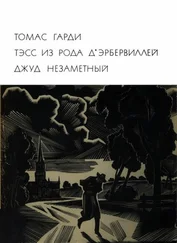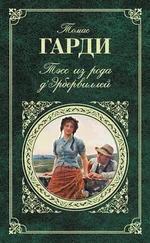| A wet Lady-Day was a spectre which removing families never forgot; damp furniture, damp bedding, damp clothing accompanied it, and left a train of ills. |
Дождливое благовещенье было бедствием для переселяющихся и надолго оставалось в памяти; ему сопутствовали мокрая мебель, мокрые постели, мокрая одежда, а следом за этим шли болезни. |
| Her mother, 'Liza-Lu, and Abraham were also awake, but the younger children were let sleep on. |
Мать, Лиза Лу и Абрэхэм тоже проснулись, но младших детей решили пока не будить. |
| The four breakfasted by the thin light, and the "house-ridding" was taken in hand. |
Они позавтракали в тусклых лучах рассвета и приступили к погрузке. |
| It proceeded with some cheerfulness, a friendly neighbour or two assisting. |
Работа спорилась - несколько друзей явилось помочь им. |
| When the large articles of furniture had been packed in position, a circular nest was made of the beds and bedding, in which Joan Durbeyfield and the young children were to sit through the journey. |
Громоздкая мебель была водворена на подводу. Для Джоан Дарбейфилд с младшими детьми соорудили на ней из постелей что-то вроде большого гнезда. |
| After loading there was a long delay before the horses were brought, these having been unharnessed during the ridding; but at length, about two o'clock, the whole was under way, the cooking-pot swinging from the axle of the waggon, Mrs Durbeyfield and family at the top, the matron having in her lap, to prevent injury to its works, the head of the clock, which, at any exceptional lurch of the waggon, struck one, or one-and-a-half, in hurt tones. |
После окончания погрузки пришлось-долго ждать, пока привели выпряженных лошадей. Наконец часа в два тронулись в путь: под повозкой болтался привязанный к оси кухонный котел, на вещах восседала окруженная младшими детьми миссис Дарбейфилд, державшая на коленях часы, чтобы они не сломались, и при каждом сильном толчке они обиженно отзванивали час или час с четвертью. |
| Tess and the next eldest girl walked alongside till they were out of the village. |
Тэсс и старшая девочка шли рядом с возом, пока не выбрались из деревни. |
| They had called on a few neighbours that morning and the previous evening, and some came to see them off, all wishing them well, though, in their secret hearts, hardly expecting welfare possible to such a family, harmless as the Durbeyfields were to all except themselves. |
Утром и накануне вечером они заходили попрощаться к соседям, и кое-кто вышел их проводить и пожелать им удачи, но в глубине души мало кто верил, что благополучие возможно для такой семьи, как Дарбейфилды, хотя никому, кроме себя, они не причиняли зла. |
| Soon the equipage began to ascend to higher ground, and the wind grew keener with the change of level and soil. |
Дорога пошла в гору, и чем выше они поднимались, тем сильнее становился ветер. |
| The day being the sixth of April, the Durbeyfield waggon met many other waggons with families on the summit of the load, which was built on a wellnigh unvarying principle, as peculiar, probably, to the rural labourer as the hexagon to the bee. |
Так как сегодня было благовещенье, то Дарбейфилды встречали на своем пути немало других семей, восседающих на возах с нехитрым скарбом, всегда уложенным одним и тем же способом, очевидно, столь же естественным для сельских батраков, как шестиугольник для пчел. |
| The groundwork of the arrangement was the family dresser, which, with its shining handles, and finger-marks, and domestic evidences thick upon it, stood importantly in front, over the tails of the shaft-horses, in its erect and natural position, like some Ark of the Covenant that they were bound to carry reverently. |
Основой сооружения являлся кухонный шкаф с блестящими ручками, захватанный пальцами и носивший множество других признаков многолетней службы; он величественно стоял впереди, возвышаясь над хвостами лошадей, -стоял, словно ковчег завета, который надлежит нести с благоговением. |
| Some of the households were lively, some mournful; some were stopping at the doors of wayside inns; where, in due time, the Durbeyfield menagerie also drew up to bait horses and refresh the travellers. |
Иные семьи были веселы, другие - сумрачны; кое-кто останавливался у дверей придорожных харчевен. Наконец остановилась и подвода Дарбейфилдов: нужно было покормить лошадей и самим подкрепиться. |
| During the halt Tess's eyes fell upon a three-pint blue mug, which was ascending and descending through the air to and from the feminine section of a household, sitting on the summit of a load that had also drawn up at a little distance from the same inn. |
Во время этой остановки взгляд Тэсс упал на трехпинтовую кружку, которую то и дело подавали на остановившийся неподалеку воз сидевшим там женщинам. |
| She followed one of the mug's journeys upward, and perceived it to be clasped by hands whose owner she well knew. Tess went towards the waggon. |
Проследив очередное путешествие кружки, Тэсс вдруг узнала ту, в чьих руках она теперь оказалась. |
| "Marian and Izz!" she cried to the girls, for it was they, sitting with the moving family at whose house they had lodged. |
-Мэриэн! Изз! - окликнула она девушек; они перебирались на новое место вместе с семьей крестьянина, в чьем доме они жили. |
| "Are you house-ridding to-day, like everybody else?" |
- И вы тоже переселяетесь? |
| They were, they said. |
Они ответили утвердительно. |
| It had been too rough a life for them at Flintcomb-Ash, and they had come away, almost without notice, leaving Groby to prosecute them if he chose. |
В Флинтком-Эше жилось слишком тяжело, и они уехали, даже не предупредив заранее фермера Гроби, - пусть он подает на них в суд, если хочет. |
| They told Tess their destination, and Tess told them hers. |
Они сообщили Тэсс, куда держат путь, и та, в свою очередь, дала свой новый адрес. |
| Marian leant over the load, and lowered her voice. |
Мэриэн, нагнувшись к ней с воза, шепнула: |
| "Do you know that the gentleman who follows 'ee-you'll guess who I mean-came to ask for 'ee at Flintcomb after you had gone? |
- А знаешь, тот джентльмен, что волочился за тобой, - уж ты догадываешься, о ком я говорю, -приходил в Флинтком, когда ты оттуда ушла. |
| We didn't tell'n where you was, knowing you wouldn't wish to see him." |
Мы ему не сказали, где ты: знали, что ты не хочешь его видеть. |
| "Ah-but I did see him!" Tess murmured. |
- Да, но я все-таки его видела, - прошептала Тэсс. |
| "He found me." |
- Он меня отыскал. |
| "And do he know where you be going?" |
- А знает он, куда ты теперь едешь? |
| "I think so." |
- Думаю, что знает. |
| "Husband come back?" |
- А твой муж вернулся? |
| "No." |
- Нет. |

![Томас Вулф - Взгляни на дом свой, ангел [английский и русский параллельные тексты]](/books/32195/tomas-vulf-vzglyani-na-dom-svoj-angel-anglijskij-thumb.webp)
![Агата Кристи - На краю [английский и русский параллельные тексты]](/books/32247/agata-kristi-na-krayu-anglijskij-i-russkij-paralle-thumb.webp)
![Сакс Ромер - Ведьмино отродье [английский и русский параллельные тексты]](/books/33237/saks-romer-vedmino-otrode-anglijskij-i-russkij-thumb.webp)
![Агата Кристи - Объявлено убийство [английский и русский параллельные тексты]](/books/33247/agata-kristi-obyavleno-ubijstvo-anglijskij-i-russ-thumb.webp)
![Фрэнсис Фицджеральд - По эту сторону рая [английский и русский параллельные тексты]](/books/34130/frensis-ficdzherald-po-etu-storonu-raya-anglijskij-thumb.webp)

